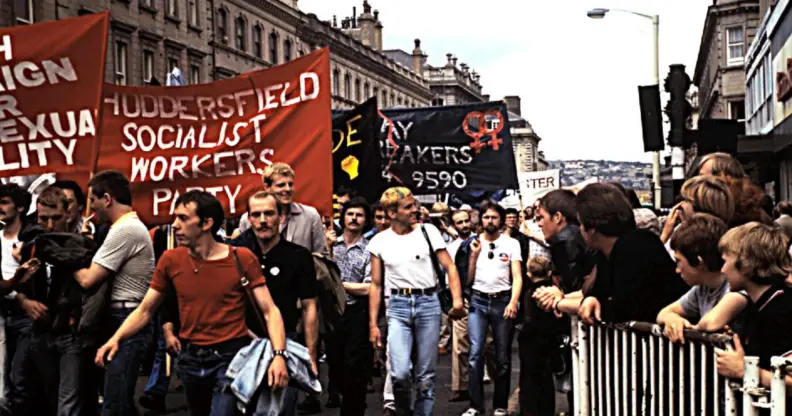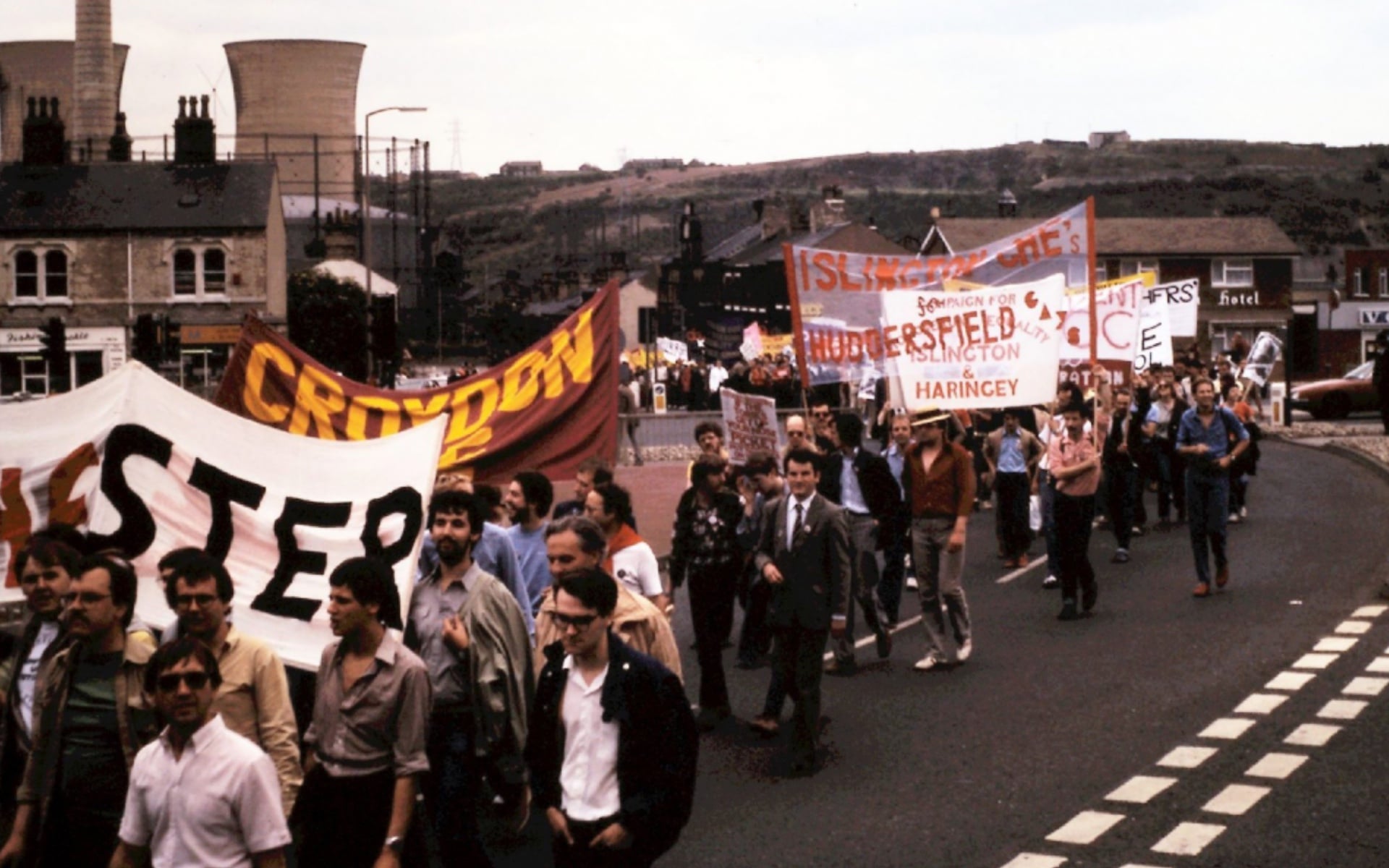Remembering the day defiant activists clashed with the National Front over an iconic Huddersfield gay bar

Pride in London relocated to Huddersfield. (Photo courtesy of Peter Scott-Presland)
London has had a Pride march almost every year since 1970, when the first queer campaigners marched through the streets demanding equality.
But the event hasn’t always gone ahead in England’s capital city – in 1981, organisers decided to move it to Huddersfield, West Yorkshire, in protest against the police’s repeated raids on a local gay bar.
The result was one of the UK’s most sensational Pride marches, with the far-right National Front decamping on the town in a bid to put a stop to queer Londoners’ act of defiance.
At that time, The Gemini was Northern England’s best-loved gay bar. Gay and bisexual men travelled from miles around to visit the queer establishment, giving many their first chance at finding their community.
Steven Alcock, an author from Huddersfield, told Yorkshire Live in 2016 that The Gemini was “the biggest, brashest and best gay club in the whole of the north of England” by the late 1970s.
“In the mid to late 1970s the Manchester gay scene hadn’t quite revved up, Sheffield didn’t have any regular gay club and Leeds only had the pitiful Charlies and the occasional Gay Lib Disco. Bradford fared little better. Huddersfield was slap in the middle of the lot (as well as various other towns in the region) with fairly good transport links and fast motorway connections,” Alcock said.
The Gemini was “the plushest club” Alcock had ever seen at the time, with an enormous dance floor, mirrored walls, strobe lights and a mirror ball. Gay men like him spent their nights dancing the night away to Donna Summer, Sister Sledge, Earth, Wind & Fire and The Bee Gees – but The Gemini’s success suddenly took a downward turn when West Yorkshire Police took an interest in the establishment in 1981.
That year, police started regularly raiding the premises, and they later challenged the club’s licence renewal, arguing that it was a “cesspit of filth”.
According to Alcock, there were, naturally, “a few tame goings on in the outside back yard downstairs, but it was hardly a Roman orgy. Especially not in winter!”
But the West Yorkshire Police quickly developed a vendetta against The Gemini, Alcock said.
“Raids became ever more frequent. We were lined up and our names and addresses taken,” he explained.
Gay liberation activists marched through Huddersfield with a pink Roll’s Royce
Gradually, gay liberation activists in London got word of what was going on in Huddersfield – and they were horrified. The marches that had taken place in the capital city up to that point had generally tended to focus on gay visibility and a more generalised push for equality. The police’s obsession with The Gemini presented a new opportunity – it gave activists the chance to push for specific, targeted change, while standing up for their queer counterparts in the north.
The Campaign for Homosexual Equality (CHE), the group that organised London’s Pride, decided to relocate its march to Huddersfield in protest against police raids on The Gemini.
The march was led by John Addy, owner of The Gemini, who drove through Huddersfield in his pink Roll’s Royce surrounded by gay liberation activists from London. It was a remarkable sight – but it proved controversial for a number of reasons, according to activist Peter Scott-Presland, who helped to organise the event.
Speaking to Rachel Larman of West Yorkshire Queer Stories (WYQS) in 2019, Scott-Presland said Addy’s pink Roll’s Royce riled up some of the more socialist-leaning Londoners.
“Such an ostentatious display of wealth, even if it was a very camp display, didn’t go down terribly well with a lot of the more radical elements, and he told us afterwards unfortunately that his lovely pink Roll’s Royce was covered with scratches afterwards, with people taking their keys and going along the side of it, so he was a bit p**sed off about that,” Scott-Presland reflected.
Scott-Presland and other activists marched through Huddersfield towards the town’s polytechnic, where they had planned a day of entertainment for queer revellers.
Needless to say, the march didn’t go off without a hitch, thanks to the ominous presence of the National Front.
“We had tremendous excitement getting from the park to the thing because this is where all the National Front people came out of the woodwork,” Scott-Presland said.
“Once the march was actually dispersed, we became more vulnerable, so groups of skinheads just materialised around the corner as you were going along the streets. Because we have a banner with us, we were fairly well placed to react because we simply took the banner down like a lance, a battering ram, and just charged into this group of skinheads and we got through it.
“I don’t think there were actually any casualties, but it was quite exciting and it felt really good to be doing something like Pride harnessed to a particular cause.
“And it was really the first year that it was anything more than, ‘Let’s come out’, ‘Let’s show how many of us we are’, that kind of generalised political objective,” he said.
London Pride’s decision to decamp to Huddersfield worked. The Gemini got to keep its licence and the bar continued to operate for a number of years. Sadly, the club ultimately closed in the 1980s as the gay scenes in Manchester and Leeds took over.
However, queer people who spent time in The Gemini remember the venue fondly as the place that gave them their first glimpse of a gay community.
Meanwhile, LGBT+ Londoners who fought for equality in the 1980s will always remember the time they flocked to Huddersfield to fight for a local gay bar’s right to exist.


